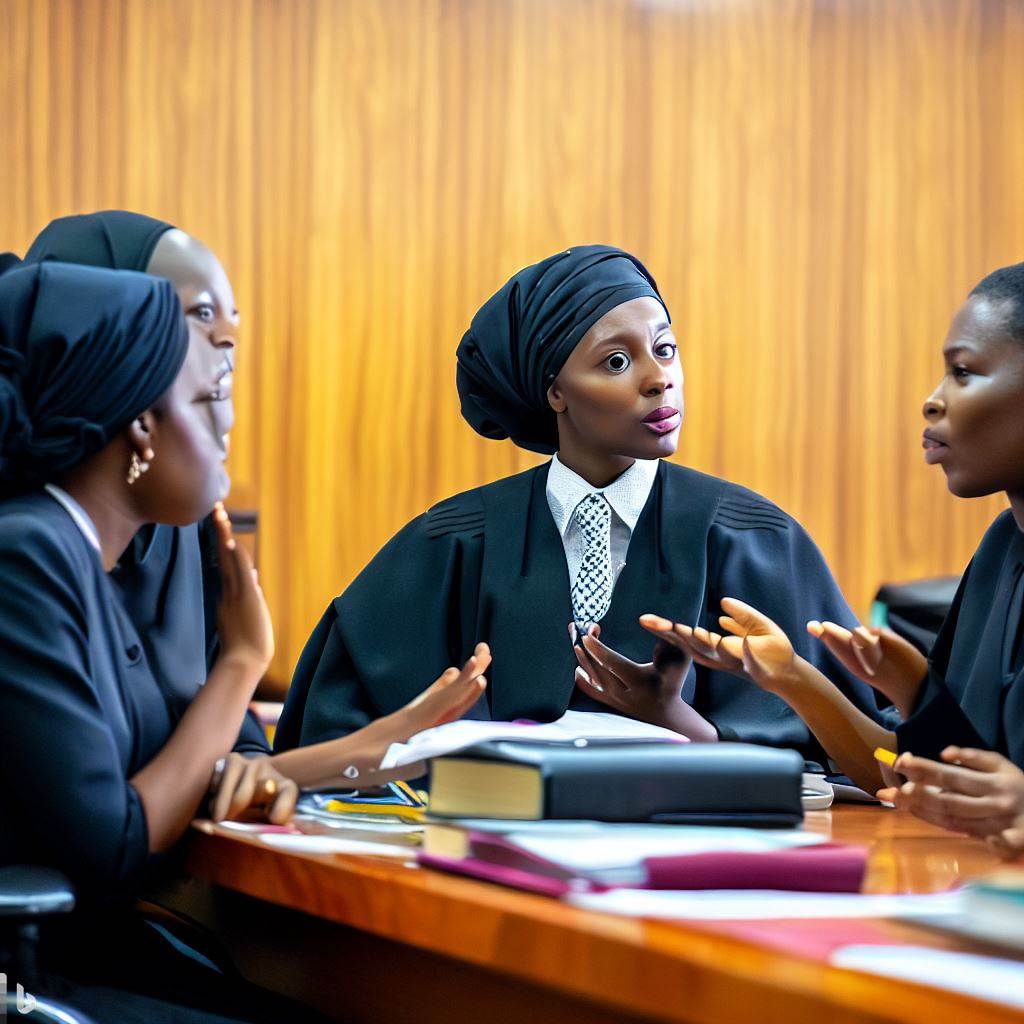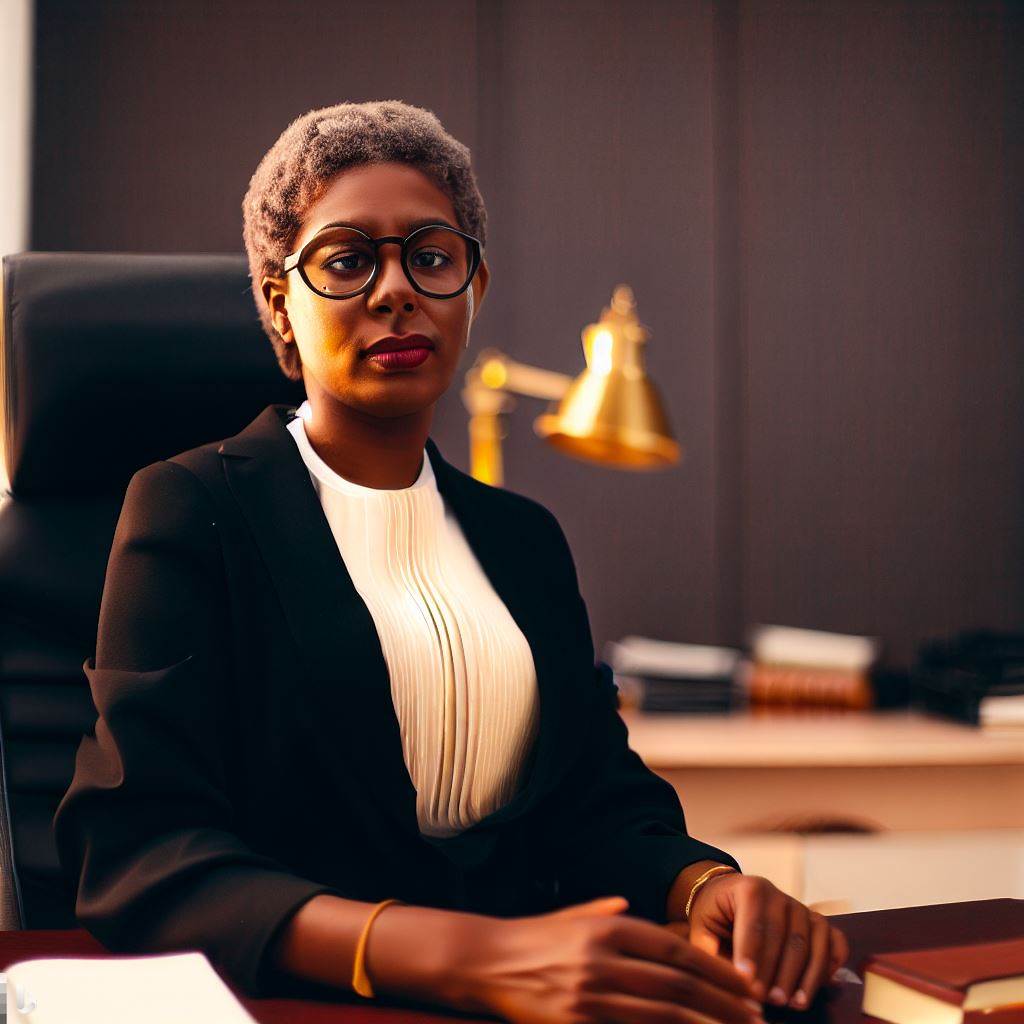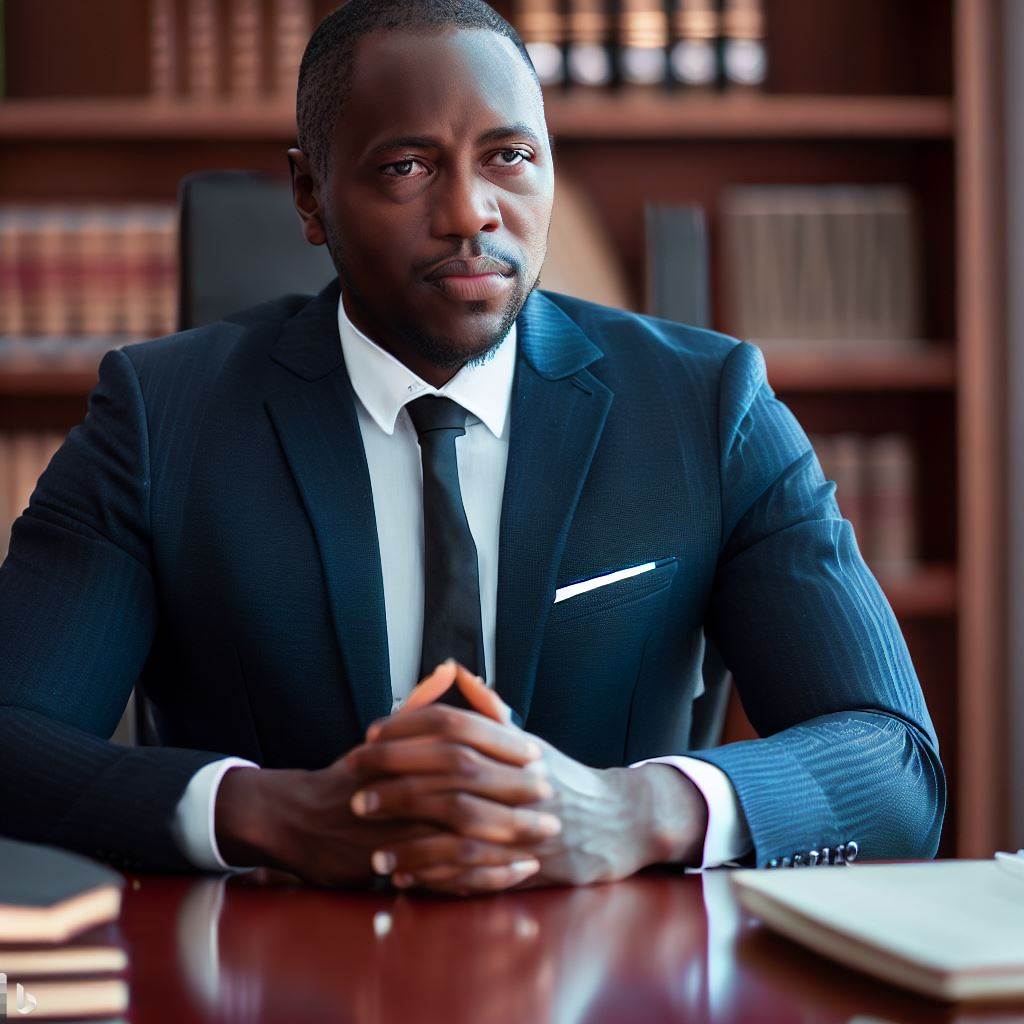Introduction
Female lawyers in Nigeria face unique prospects and challenges in their profession.
Understanding the prospects and challenges for female lawyers is crucial for promoting gender equality in the legal profession.
Nigeria has a vibrant legal profession with numerous opportunities for legal practitioners.
This post aims to explore the prospects and challenges faced by female lawyers in Nigeria, highlighting the importance of gender equality in the legal profession.
Read: Nigerian Attorneys and Social Justice: A Critical View
Prospects for Female Lawyers in Nigeria
Increasing opportunities for female lawyers
- Women are now admitted into law schools on equal footing as men.
- There is a growing number of female legal practitioners in Nigeria.
Representation and visibility
- Law firms are advancing towards gender parity, providing better representation for female lawyers.
- Female lawyers are assuming leadership roles in their firms, enhancing their visibility in the legal profession.
Access to mentorship and networking opportunities
- Women-focused legal organizations have been formed, providing mentorship and networking opportunities for female lawyers.
- Legal associations are implementing supportive initiatives to assist and empower female lawyers in Nigeria.
Female lawyers in Nigeria have both prospects and challenges in their pursuit of a successful legal career.
In this section, we will focus on the prospects and opportunities available for female lawyers, highlighting the positive developments that have been made in recent years.
A. Increasing opportunities for female lawyers
- Women are now admitted into law schools on equal footing as men. Previously, women faced barriers to entry, but now they have equal access to legal education, fostering gender equality within the profession.
- Nigeria has seen a growing number of female legal practitioners. More women are choosing law as a career, creating a diverse and inclusive legal community.
B. Representation and visibility
- Law firms in Nigeria are advancing towards gender parity. They recognize the importance of diversity and are actively working to provide better representation for female lawyers within their organizations.
- Female lawyers are assuming leadership roles in their firms. This is a positive shift that not only showcases their capabilities but also inspires other women to pursue leadership positions in the legal profession.
C. Access to mentorship and networking opportunities
- Women-focused legal organizations have been formed to support and empower female lawyers. These organizations provide mentorship programs, networking events, and resources tailored to the specific needs of women in the legal field.
- Legal associations in Nigeria also play a crucial role in supporting female lawyers. They have implemented initiatives aimed at addressing the unique challenges faced by women in the profession and providing them with the necessary support to thrive.
Overall, the prospects for female lawyers in Nigeria are promising.
The increasing opportunities, improved representation, and access to mentorship and networking resources are contributing to the growth and success of female legal practitioners in the country.
It is essential to continue advocating for gender equality and creating an inclusive environment where all lawyers, regardless of gender, can thrive and contribute to the legal profession in Nigeria.
Read: Pro Bono Work of Nigerian Attorneys: An Unseen Aspect

Challenges Facing Female Lawyers in Nigeria
Despite significant progress in recent years, female lawyers in Nigeria continue to face numerous challenges that hinder their professional growth and success.
This section will explore the various obstacles that women in the legal profession encounter, shedding light on the gender biases and stereotypes that persist in Nigerian society.
A. Gender bias and stereotypes
- Gender discrimination is prevalent in the legal profession.
- Women are often perceived as less competent or committed than their male counterparts.
1. Prevalence of gender discrimination
The prevalence of gender discrimination within the legal profession is a major obstacle for female lawyers in Nigeria.
Women often experience biased treatment, both in terms of opportunities and remuneration.
African traditional norms and cultural beliefs contribute to the perpetuation of such discriminatory practices, making it difficult for women to thrive in the field.
2. Perception of women as less competent or committed
In addition to discrimination, female lawyers also contend with the perception that they are less competent or committed compared to their male counterparts.
This stereotype undermines their credibility, affecting their professional growth and client base.
The notion that women are primarily suited for family life rather than a demanding career further reinforces gender biases and restricts opportunities for female lawyers.
Read: The Evolution and History of Legal Professions in Nigeria
B. Work-life balance
- Female lawyers struggle to balance professional demands and family responsibilities.
- There is a lack of support systems, especially for working mothers.
One of the biggest challenges facing female lawyers in Nigeria is the struggle to maintain a work-life balance.
1. Juggling professional demands with family responsibilities
Juggling pressing professional demands with family responsibilities can be overwhelming and often requires women to make significant sacrifices.
The demanding nature of legal practice, including long working hours, court appearances, and unpredictable schedules, makes it challenging for female lawyers to fulfill their personal obligations.
2. Limited support systems for working moms
Furthermore, the lack of support systems for working mothers compounds the challenges of achieving work-life balance.
The absence of affordable and accessible childcare facilities, flexible work arrangements, and policies that accommodate parental responsibilities further hinders women’s career progression.
These barriers disproportionately affect female lawyers, limiting their ability to compete on an equal footing with male colleagues.
C. Limited promotions and career growth opportunities
- Many law firms and corporations have a glass ceiling effect that restricts women’s advancement.
- Female lawyers are underrepresented in higher levels of the judicial system.
Female lawyers in Nigeria face significant obstacles when it comes to promotions and career advancement.
1. Glass ceiling effect in law firms and corporations
Many law firms and corporations maintain a glass ceiling that prevents women from reaching leadership positions.
This barrier is often rooted in gender bias and perpetuated by stereotypes about women’s capabilities and commitment to their careers.
2. Under-representation in higher levels of judiciary
Additionally, female lawyers are under-represented in higher levels of the judicial system.
This under-representation limits their ability to shape legal policies and institutions, ultimately hindering gender-sensitive decision-making and the implementation of progressive reforms.
The lack of diversity in the judiciary not only affects women’s professional growth but also undermines the overall fairness and inclusivity of the legal system.
D. Cultural and societal barriers
- Cultural norms often discourage women from participating fully in the legal profession.
- Female lawyers face social expectations and unique challenges in a male-dominated field.
1. Cultural norms affecting women’s participation in legal profession
Societal expectations and cultural norms significantly impact women’s participation in the legal profession in Nigeria.
Traditional gender roles and expectations restrict women’s ability to pursue a legal career fully.
Societal pressure to conform to traditional gender roles, including marriage and childbearing, poses unique challenges for female lawyers who must balance personal and professional aspirations.
2. Social expectations and challenges of being a female lawyer
Female lawyers often face resistance from their families and communities, who may view their career choice as unconventional or “unfeminine.”
The stereotypes surrounding female lawyers, such as being overly aggressive or masculine, further exacerbate these challenges.
Overcoming cultural and societal barriers requires not only individual determination but also systemic changes that challenge gender norms and promote equal opportunities.
Basically, female lawyers in Nigeria face numerous challenges in their pursuit of professional success.
Gender bias and stereotypes continue to undermine their credibility and restrict opportunities for advancement.
The struggle to achieve work-life balance, limited promotions and career growth opportunities, and cultural and societal barriers further compound the challenges they face.
Addressing these challenges requires concerted efforts from individuals, organizations, and policymakers to create a more inclusive and equitable legal profession in Nigeria.
Read: Ethical Considerations for Entertainment Lawyers in Nigeria
Strategies and Solutions
Legal reforms and policies
- Enforce gender equality laws and regulations.
- Implement measures to combat gender discrimination in legal settings.
Building supportive networks and mentorship programs
- Encourage women empowerment initiatives in the legal field.
- Facilitate mentorship opportunities for aspiring and young female lawyers.
Promoting work-life balance and family-friendly policies
- Establish flexible work arrangements.
- Create support structures for working mothers.
Education and awareness
- Promote education about women’s rights among legal professionals.
- Foster awareness to challenge gender biases and stereotypes.
Implementing effective strategies and solutions is crucial in improving the prospects and overcoming the challenges faced by female lawyers in Nigeria.
By focusing on legal reforms, supportive networks, work-life balance, and education and awareness, positive change can be achieved.
A. Legal reforms and policies
Legal reforms and policies play a significant role in ensuring gender equality within the legal profession.
The enforcement of gender equality laws and regulations is essential to protect the rights of female lawyers.
By implementing measures to combat gender discrimination in legal settings, such as implementing diversity and inclusion policies, Nigeria can provide a fair and equal environment for female lawyers to thrive.
B. Building supportive networks and mentorship programs
Building supportive networks and mentorship programs is another critical strategy.
Encouraging women empowerment initiatives in the legal field can create an inclusive environment that promotes equality and provides opportunities for career growth.
Facilitating mentorship opportunities for aspiring and young female lawyers allows them to learn from experienced professionals and gain valuable guidance and support.
C. Promoting work-life balance and family-friendly policies
Promoting work-life balance and family-friendly policies is crucial to address the unique challenges faced by female lawyers who are often balancing their personal and professional lives.
Establishing flexible work arrangements, such as flexible hours or remote work options, can enable female lawyers to fulfill their responsibilities both at work and at home.
It is also essential to create support structures for working mothers, such as on-site childcare facilities or extended maternity leave, to ensure that they can successfully navigate their careers while raising a family.
D. Education and awareness
Education and awareness play a vital role in challenging gender biases and stereotypes within the legal profession.
Promoting education about women’s rights among legal professionals can create a more informed and inclusive environment.
By fostering awareness of gender biases and stereotypes, legal professionals can work towards dismantling these barriers and creating a more equitable profession for all.
Essentially, the prospects and challenges for female lawyers in Nigeria can be addressed through various strategies and solutions.
By implementing legal reforms and policies, building supportive networks and mentorship programs, promoting work-life balance and family-friendly policies, and investing in education and awareness, Nigeria can pave the way for a more inclusive and empowering legal profession.
It is essential for stakeholders in the legal sector to come together and work towards creating a gender-equal future for female lawyers in Nigeria.
Read: Historical Perspective of Attorney Profession in Nigeria
Conclusion
Female lawyers in Nigeria have immense prospects for success.
They have the opportunity to make significant contributions to the legal profession, championing justice and equality.
However, they also face numerous challenges, including gender bias, limited access to resources and support, and societal expectations.
To tackle these challenges, we must invest in mentorship programs, workshops that raise gender awareness, and workplace gender equality policies.
Female lawyers are encouraged to seize opportunities, break barriers, and overcome obstacles with determination and resilience.
By doing so, they can pave the way for future generations and create a more inclusive legal profession.
In closing, it is vital for society as a whole to recognize the value and potential of female lawyers in Nigeria.
By providing them with the necessary support and empowering them to thrive, we can build a more equitable and just legal system.




